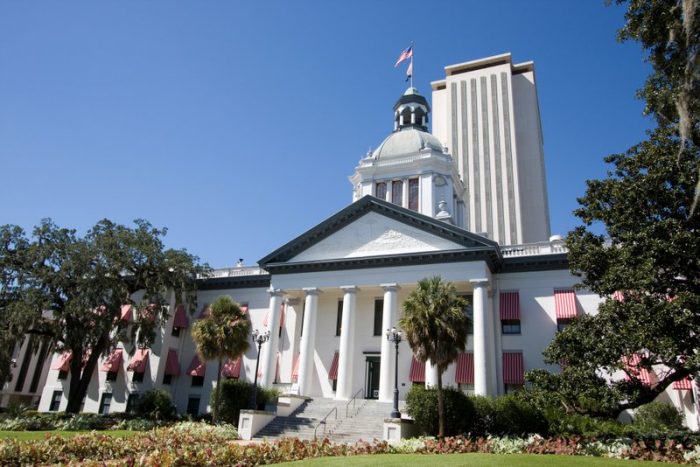‘Changes needed’ with CPUC decision says California Governor and other solar policy updates this week

California’s proposed NEM 3.0 decision would kill the return on investment homeowners expect from a solar system. Sage analysis shows the monthly fees over time could add up to more than the cost of the systems themselves, and a recent SolarReviews survey showed a 95 percent drop in interest in home solar under the new, proposed rules. The decision seems especially unfair and illogical in California, a state in favor of mandating that all new homes and commercial construction include solar and storage.
The unpopularity of the decision caused thousands of solar workers and consumers, housing advocates, faith leaders, environmentalists, conservationists, and climate activists to hold rallies and marches to California Public Utilities Commission (CPUC) buildings in Los Angeles and San Francisco. The photo above is from the San Francisco rally.
The demonstrations might help as the California Governor Gavin Newsom also expressed issues with the proposed decision during a state budget press conference when asked about it: “That draft plan that was recently released, I just had a chance to review, and I’ll say this about the plan, we still have some work to do.”
Later, Politico’s Colby Bermel followed-up on the proposed decision, asking if the Governor was “worried that cutting installation benefits and imposing a monthly fee will hurt the solar industry and customers who want to install panels?”
Governor Newsom reiterated his previous response, saying “do I think changes need to be made, yes I do.”
The CPUC will hold a final vote on the future of net metering following a 25-day comment period on the proposed decision and alternative proposals. The current proposal is set for a vote on January 27 but that date could be moved if an alternate decision is proposed. The proposed changes to net metering could go into effect as early as this Spring.
To be continued. UPDATE: The vote has been officially postponed to Feb 10.
Floridians for Solar Choice bidding to change state constitution

This week, the Southern Alliance for Clean Energy explained why a proposed bill in Florida is so bad for the Sunshine State’s residents and solar industry. Which is why they are part of the Floridians for Solar Choice (FSC) bid to change the Florida Constitution in order to protect the right of Floridians to utilize the sun to generate, collect, and sell solar power.
FSC Chairman Tory Perfetti reported a $420,000 contribution to do just that this week. Floridians for Solar Choice is organizing a massive statewide effort to collect the required petitions to get the initiative on the ballot. The language has already passed the Florida Supreme Court’s review.
“Floridians should have the ability to choose from multiple sources of energy to power their homes and businesses,” stated FSC Chairman Perfetti. “This amendment will allow greater options for citizens and business owners in Florida to participate in their energy future without mandates or subsidies. The Floridians for Solar Choice Coalition is a broad coalition representative of the citizens of Florida that will be working towards the goal of allowing all of us a vote on our shared energy future.”
Dr. Stephen A. Smith, FSC Board member and Executive Director of the Southern Alliance for Clean Energy, added, “We’ve been motivated by Governor DeSantis’ call for a free state of Florida and our desire for Florida to be a leader in both clean and alternative energy. The sunshine state should harness the power of the sun and that power should not be monopolized by any one group, company, or organization. We believe no one owns the sun in the sunshine state.”
In order to get the measure on the ballot, Floridians for Solar Choice will need to collect 891,589 signatures in twenty-four months starting February 2, 2022. The goal is for the measure to make the 2024 ballot. Here’s the petition info.
Mississippi debuts new net metering rules, with focus on LMI incentive

The Mississippi Public Service Commission (PSC) updated the state’s Net Metering and Interconnection Rules, which expand the net metering program, improve total compensation rates for solar customers, and prioritize solar adoption for low-to-moderate income (LMI) customers. It states:
“The MRENMR [Mississippi Renewable Energy Net Metering Rule and the Mississippi Distributed Generator Interconnection Rule] adopted by the Commission established a price for excess energy equal to the utility’s avoided cost plus a “non-quantifiable expected benefits adder” to equal 2.5 cents/kWh. The MRENMR also included an additional incentive for low-income customers equal to 2 cents/kWh payable to the first 1,000 qualifying low-income customers.”
“We commend the Mississippi Public Service Commission for updating its net metering rules and expanding solar access in Mississippi,” stated Will Giese, Southeast regional director for the Solar Energy Industries Association (SEIA). “The net metering program now covers Mississippi households that are 250% of the federal poverty line and below, which will help even more Mississippians experience the cost-saving benefits of solar energy.
“While we are disappointed that the Public Service Commission did not offer the full retail rate for net metering, the order will move Mississippi’s solar policy forward, and SEIA will continue to advocate for straight forward and smart polices that grow the solar industry. As we’ve seen in Arkansas, easy-to-understand net metering programs can encourage rooftop solar adoption and provide benefits to all ratepayers.”
Regardling the upfront rebate …
Each electric IOU shall offer a one-time $3,000.00 upfront cash rebate to any retail residential customer, who is also eligible for the MRENMR low-income benefits adder, purchasing a renewable distributed energy facility sized between 3kW and 6 kW and to be used, at least in part, for self-supply.
Each electric IOU shall offer an additional $1,000.00 cash rebate to any retail residential customer, if the retail residential customer receives an approved home energy audit and implements energy efficiency measures that are reasonably expected to result in an annual savings of 1,000 kWh.
Only one $3,000.00 distributed energy facility upfront cash rebate and one $1,000.00 energy efficiency investment rebate shall be made available to each eligible retail customer account.
Sufficient proof of purchase must be provided prior to receipt of any $3,000.00 distributed energy facility rebate.
Sufficient proof of an expected reduction of kWh consumption must be provided prior to receipt of any $1,000.00 energy efficiency investment rebate.
The total annual rebate amounts shall not exceed 2% of an IOU’s residential retail sales for the calendar year 2020.
The cost of the rebates shall be accounted for and recovered through rates in the same manner as demand-side management programs established under Rule 29.
The rebate program shall begin following Commission approval of the abovementioned compliance filings and shall end 5 years from the date of the IOU’s implementation of its respective rebate programs.





Comments are closed here.